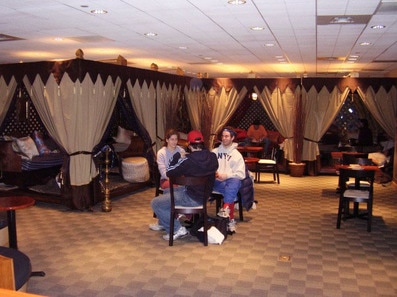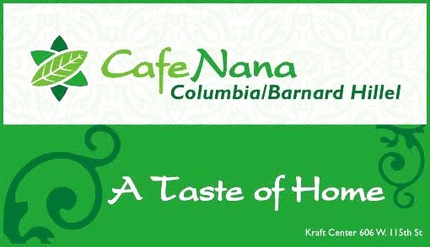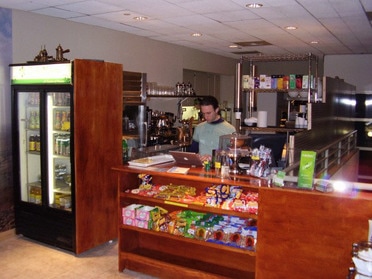//features//
Spring 2017
"A Taste of Home"
The Origins of Columbia’s Kosher Café
Tova Kamioner
 Students enjoy the Moroccan atmosphere at Cafe Nana in 2005. Photo credit: Akiva Zablocki, GS '07. Students enjoy the Moroccan atmosphere at Cafe Nana in 2005. Photo credit: Akiva Zablocki, GS '07.
Hours before he was set to meet with the director of Hillel, Edoe Cohen (GS/JTS, ’07) received a phone call. “Listen, we’re not going to do it in the end,” said the restaurateur who had originally agreed to run the new café in the Kraft Center for Jewish Student Life. Although Edoe was a full-time student with no culinary experience, he and his friends decided to go ahead with the project anyway, and Café Nana was born.
Few Columbia students know that Café Nana, the restaurant on the second floor of the Kraft Center, began as a student project in 2005. Today—filled with students pretending to focus, the occasional gathering of elderly people, and two Israeli men calling out Panini orders 5-30 minutes after they are requested—the café is known more for its delicious (though somewhat overpriced) menu than for its history. A Café Nana regular, I only found out about its past when a family friend, Ben Muller (GS, ’07), mentioned it in passing over winter break. Ben connected me with two of its founders, Edoe and Deborah Plum (CC, ’07), so that I could follow up on my curiosity [1]. Nana Then: A Home Base for Israel Advocacy Edoe Cohen spoke to me from California on speakerphone with his wife and children in the car, pausing occasionally to answer his toddler’s interjections. We had some trouble finding an interview time because he and his wife have a newborn, so this was how we made it work. Edoe apologized for playing phone tag, and I thanked him for making time to talk about the café. “Of course,” he replied. “I’m happy to hear it’s still kicking.” Edoe first arrived at Columbia in 2003 as a General Studies student after spending six years in the Israel Defense Forces, transferring to the joint program between GS and the Jewish Theological Seminary. During the semesters leading up to the café’s founding in 2005, the atmosphere surrounding Israel on campus was particularly fraught. A documentary called Columbia Unbecoming had been released the year before, claiming that professors in the Middle Eastern, South Asian, and African Studies Department were silencing and intimidating Jewish students in conversations about Israel in the classroom. At the same time, the Second Intifada was raging in Israel, causing the State Department to put Israel on its list of places not to travel and Columbia to remove Israel from its list of study abroad options. “On the one hand we thought, okay, we can speak to the administration and change the policy of allowing students to study abroad. That’s probably going to take forever,” Edoe said. “On the other hand, we can help encourage students to go study in Israel. So that’s what we did; we did a huge study abroad fair on campus.” Various organizations joined in orchestrating the fair as a reaction to the Columbia Unbecoming film, Edoe explained, which made the fair “a big production.” In addition to its booths for various Israeli study abroad programs, the fair also featured a mock Israeli market—a shuk—selling Israeli crafts as well as fresh food from an Upper West Side kosher Israeli grill. The shuk’s success gave Edoe an idea: Why not open a full-time kosher restaurant on campus? It would offer an alternative to the kosher options on the Upper West Side at the time, which were sparser than they are today, and fairly expensive. Edoe added: “There were [Kosher options in dining halls], but you can only have so much dining hall food.” First, he needed to find a space for the restaurant. “At the time, the second floor of Hillel was kind of barren space. It was like this lounge, with a TV, some couches, that was really not being used very much,” Edoe recalled. He pitched the idea of converting the space to an Israeli-style café to the director of the Hillel at the time, Simon Klarfeld, and to the Upper West Side Israeli grill that catered the fair. Both parties endorsed the idea. To Edoe’s disappointment, the people from the restaurant called to cancel their partnership on the day of the meeting with Klarfeld. “So, at that moment, I was like, okay, maybe I can do this.” He and his friends told Klarfeld that as long as they had the space, they could piece it all together. “That was kind of how it all started.” Edoe joined forces with his friends Deborah Plum, Ben Plum, Allyson Tash, Akiva Zablocki, and Barak Ben Ezer, as well as with his brother, Ben Cohen [2], all of whom were NYC students or recent graduates. The café opened for business in February 2006. For Edoe, the café was part of an Israel advocacy effort from day one. “What I discovered from that study abroad fair was that a good way to promote Israel is to celebrate Israel––to celebrate the culture and music,” he said. “So for example, Hadag Nachash [a popular Israeli band] performed at the end of the fair. We did other projects after that—we brought Idan Raichel [another popular Israeli musician] and he performed at the church.” I marvel over the sight of an Israeli pop sensation in the Cathedral Church of St. John the Divine. “These are more emotional things that people can connect with, kind of like going away from the politics for a second, and from the conflict, and celebrating identity and culture, food, music, film. That’s really the origin of Café Nana.” Israeli culture permeated the café, starting with the menu. “Each sandwich was a different Israeli character,” said Edoe. “So, for example, we had the chayal [Hebrew for “soldier”], which was a sandwich using tuna and corn, because those are the ingredients that you eat a lot when you’re a soldier… So things like that, you know, just a way to educate people about Jewish history and Israeli culture.” Next was the decor: Café Nana originally hosted four large Moroccan tents, the building of which was planned and organized by Ben Plum, another founder of Café Nana and an amateur carpenter. Ben and Edoe bought the materials for the tents in the Arab market in Jerusalem’s Old City in the summer of 2005, including a lantern and fabrics. They made sure to attach wheels to the bottoms of the tents so that the café could easily accommodate Jewish and Israeli-focused poetry readings and music nights. It was especially important for Edoe to showcase Jewish diversity: “The Jewish community at Columbia is very Ashkenazi based, and I wanted to really show other Jewish identities and cultures.” One example was a photography exhibit of the Abayudaya congregation in Uganda, a group in a remote African village that converted to Judaism in the early 20th century. A Columbia student volunteered in the area, and his photos were displayed in the café. The fair trade coffee they sold was farmed by this same Abayudaya congregation—for each package bought, one dollar was donated to support the community’s projects. They named the café ”Nana,” a term for mint tea, to garner the feeling of gathering. “I love naming things,” Edoe laughed, “and we had a few names. I think “bete’avon” [Hebrew, lit. “with appetite,” used in the same way as “bon apetit”] was one of the names, but Café Nana… Nana in Israel gives a feeling… it’s hospitality, it’s togetherness, it’s people eating together.” Edoe continued: “I think later I discovered that Nana is also a nickname for grandmothers, but I didn’t know that... Our slogan was 'A Taste of Home,' so that was the idea, of giving people a beautiful home.” |
[1]He included himself in the email chains so that he could take part in the nostalgia. If you're reading this, Ben, thanks for all that ensued.
[2]May his memory be for a blessing
|
//TOVA KAMIONER is a senior in Barnard College. She can be reached at tk2484@barnard.edu. Logo design by Yaniv Uncik. Photos courtesy of Akiva Zablocki, GS '07.

